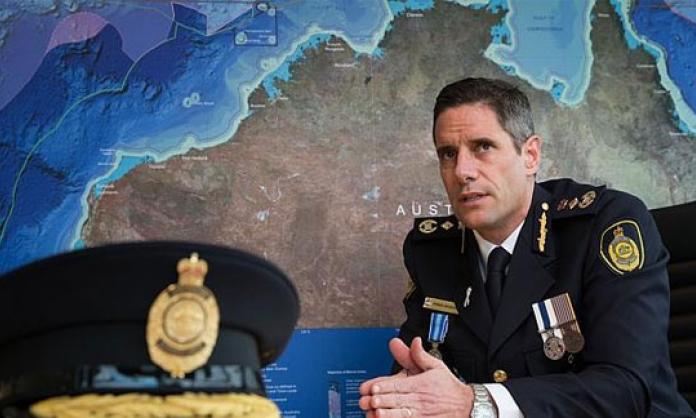The Australian Border Force, formed in July, is part of an international militarisation of national borders and the result of governments trying to associate issues of migration and asylum seeking with crime, terrorism and national security.
ABF is the result of the recent merger between the Department of Immigration and Border Protection (previously just the Department of Immigration) and the Australian Customs and Border Protection Services (previously just the Department of Trade and Customs).
As Harriet Spinks from the Parliamentary Library puts it, the creation of the ABF “marks a key milestone in the process of change which has seen the Department of Immigration shift its focus from nation building and migrant settlement, towards a greater emphasis on border security.”
The whole exercise is about tying everything into a post-9/11 world where, we are told, constant external threats can only be dealt with by increasing state power and diminishing civil liberties. The deliberate association of refugees and immigrants with the risk of terrorism has long been used to stoke racism, especially Islamophobia.
This has been all too evident in Europe, where the far right has grown significantly on an anti-immigration and anti-Muslim basis. In the US, the process of militarising borders has perhaps gone the furthest, with the ever-expanding Department of Homeland Security now employing over 21,000 armed Border Patrol Agents. Its website sums up the approach:
“The priority mission of the Border Patrol is preventing terrorists and terrorists [sic] weapons, including weapons of mass destruction, from entering the United States … [I]ts primary mission remains unchanged: to detect and prevent the illegal entry of aliens into the United States.”
In 2012 alone, 364,000 such “aliens” were reportedly arrested, though not a single international terrorist.
The ABF seems to be modelled on this agency. It employs 6,000 armed agents who have powers of arrest.
It is hard not to laugh at many of its early efforts. Ten million dollars spent on rebranding, including military-style uniforms, new signage and even a supply of ABF stuffed-dog toys as gifts for foreign dignitaries. Then there was the debacle of Operation Fortitude, the failed attempt to carry out spot visa checks in Melbourne’s CBD on 31 August.
Then there is the question of just what these 6,000 agents are going to do with their time. Their latest Facebook post boasts of rescuing Australia from a stray fishing net – hardly the stuff of action films.
But we shouldn’t laugh too hard. While the ABF’s main role is one of fear-mongering, it will be looking for ways to justify its existence. From what we know of Operation Fortitude, it was in part targeted at taxi drivers who may have been breaching visa conditions.
The ABF could well play a role in terrorising foreign workers, just as Homeland Security in the US keeps undocumented migrants living in fear. Recent investigations from Four Corners and Fairfax have demonstrated that the fear of deportation plays a massive role in allowing companies to get away with paying workers well below the minimum wage.
On 13 August, the ABF arrested 11 farm workers in Mildura. Assistant minister for immigration and border protection Michaelia Cash said: “The group were found to be unlawful non-citizens who had stayed in Australia beyond the expiry of their temporary visas.” The workers will be deported, while their employer can expect a slap on the wrist. You can bet the ABF will not be recouping the wages owed to these workers either.
This highlights another problem of the frenzy of border control. Policing the “border” is not restricted to Australia’s coastlines or airports. As the ABF website states, “We consider the border not to be a purely physical barrier separating nation states, but a complex continuum stretching offshore and onshore, including the overseas, maritime, physical border and domestic dimensions of the border.”
In other words, the agency considers itself to have the right to use its powers wherever and whenever it wants. We’re told it’s for our security, but it is all really about creating insecurity. The ABF is an attack dog with a very long leash, and one that will need to be opposed again and again in the future.








